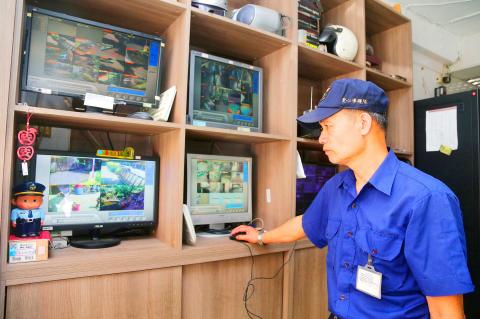Taipei plans to revise its system of keeping tabs on dangerous people, Taipei Mayor Ko Wen-je (柯文哲) said yesterday after the slaying of an eight-year-old student at an elementary school in the capital’s Beitou District (北投) on Friday.
Ko said the case raised questions about whether the city’s system should be expanded, given that it had not picked up murder suspect Kung Chung-an (龔重安) before the attack.
A review would be conducted once more was known about Kung’s social network and mental state, Ko added.

Photo: CNA
Problems revealed by the case focused more on prevention rather than the city’s response, Ko said, adding that city officers deserved a grade of 99 percent for their efficiency in handling the case.
In addition to reviewing how potentially dangerous residents are monitored, Ko said that the city would also consider revising the “open campus” policy that provides public access to school grounds.
School fences might be heightened as well, he added.
Kung was reportedly able to gain access to Beitou’s Wenhua Elementary School by hopping over a low barrier wall.
A rigorous registration system for entering campuses would be a better policy than completely blocking the entrance of strangers, Ko said, adding that a cost-benefit analysis would have to be conducted before the government would consider installing alarms in school restrooms, where Friday’s incident occurred.
He said the city’s first priority is to rebuild campus security to ensure that students feel safe attending classes.
After an emergency city meeting on Friday night, Taipei Police Commissioner Chiu Feng-kuang (邱豐光) promised to bolster safety, including conducting internal campus patrols on request.
Department of Education Commissioner Tang Chih-min (湯志民) said his department would review school security camera systems and entrance policies, as well as bolster internal patrols.
The city would also consider reintroducing officers to direct traffic near schools at the beginning and end of school days, Taipei Police Department Deputy Commissioner Chou Shou-sung (周壽松) said.

An essay competition jointly organized by a local writing society and a publisher affiliated with the Chinese Communist Party (CCP) might have contravened the Act Governing Relations Between the People of the Taiwan Area and the Mainland Area (臺灣地區與大陸地區人民關係條例), the Mainland Affairs Council (MAC) said on Thursday. “In this case, the partner organization is clearly an agency under the CCP’s Fujian Provincial Committee,” MAC Deputy Minister and spokesperson Liang Wen-chieh (梁文傑) said at a news briefing in Taipei. “It also involves bringing Taiwanese students to China with all-expenses-paid arrangements to attend award ceremonies and camps,” Liang said. Those two “characteristics” are typically sufficient

A magnitude 5.9 earthquake that struck about 33km off the coast of Hualien City was the "main shock" in a series of quakes in the area, with aftershocks expected over the next three days, the Central Weather Administration (CWA) said yesterday. Prior to the magnitude 5.9 quake shaking most of Taiwan at 6:53pm yesterday, six other earthquakes stronger than a magnitude of 4, starting with a magnitude 5.5 quake at 6:09pm, occurred in the area. CWA Seismological Center Director Wu Chien-fu (吳健富) confirmed that the quakes were all part of the same series and that the magnitude 5.5 temblor was

The brilliant blue waters, thick foliage and bucolic atmosphere on this seemingly idyllic archipelago deep in the Pacific Ocean belie the key role it now plays in a titanic geopolitical struggle. Palau is again on the front line as China, and the US and its allies prepare their forces in an intensifying contest for control over the Asia-Pacific region. The democratic nation of just 17,000 people hosts US-controlled airstrips and soon-to-be-completed radar installations that the US military describes as “critical” to monitoring vast swathes of water and airspace. It is also a key piece of the second island chain, a string of

The Central Weather Administration has issued a heat alert for southeastern Taiwan, warning of temperatures as high as 36°C today, while alerting some coastal areas of strong winds later in the day. Kaohsiung’s Neimen District (內門) and Pingtung County’s Neipu Township (內埔) are under an orange heat alert, which warns of temperatures as high as 36°C for three consecutive days, the CWA said, citing southwest winds. The heat would also extend to Tainan’s Nansi (楠西) and Yujing (玉井) districts, as well as Pingtung’s Gaoshu (高樹), Yanpu (鹽埔) and Majia (瑪家) townships, it said, forecasting highs of up to 36°C in those areas